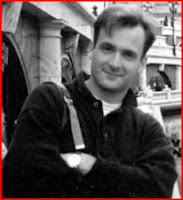
These are the points an NUJ delegation wants to raise about the murder 10 years ago of internet journalist Gyorgy Gongadze in a meeting at the Ukranian Embassy in London today.
General points on the Gongadze case.
The main point that arose from our meetings with the ambassador last year was that, while the main suspect in the murder of Gyorgy Gongadze, general Olexiy Pukach, had been arrested (in July 2009), no discernible progress had been made on the investigation of those who instigated and organised the murder. A year later, this has not changed.
The result of the whole process is that the Gongadze case has come to epitomise the impunity with which politicians and other powerful people conspire to silence journalists. It is common knowledge that former president Leonid Kuchma, current parliamentary speaker Volodymyr Lytvyn and others, discussed harming Gongadze, and that a few days later he was dead. But, ten years later, none of the participants in those conversations nor any of those who organised the killing have been held to account in court.
The NUJ asks the ambassador to convey to the new president and government of Ukraine our continuing concern about this and our continued determination that this injustice should be dealt with.
Issues arising from the arrest of General Pukach
The investigation of the Gongadze case has not moved forward significantly since the arrest on 21 July last year of Olexiy Pukach.
Politicians and officials from the general prosecutor’s office have stated publicly and repeatedly that Pukach collaborated with the investigation.
And yet there is no indication – more than a year after Pukach’s arrest – that he has provided, or that investigators have followed, any leads towards those who ordered him to arrange to kidnap Gongadze. No-one except for Pukach himself has been named as a suspect or accused.
How can this be explained? Does the government share our concern about this? What will be done to bring the instigators of the murder to justice?
Obstructions to the investigation
The authorities have previously acknowledged the role of Ukrainian officials in obstructing the Gongadze investigation, e.g. former prosecutor Potebenko (but not only him). Last year we asked what had been done about bringing such officials to account for the deliberate obstruction of justice. We would like to repeat this question.
The “Melnychenko tapes”
Together with leads that may or may not have been provided by Pukach, we are all aware that another key piece of evidence regarding the way that the murder of Gongadze was instigated and organised is the so-called “Melnychenko tapes”.
However, nearly ten years after the public release of the tapes, no formal or legal stance has been adopted by the authorities concerning the activity of major Melnychenko, who tape-recorded the incriminating conversations about Gongadze in Kuchma’s office. Melynchenko has never been formally questioned by prosecutors. Until the authorities take a stance, the tape recordings can not be used as evidence.
Within a few weeks, Melnychenko’s activity will be protected by the statute of limitations (ten years) and this chance will be lost. Does the government have any comment?
The Klimentyev case
Over the last ten years, international journalists’ organisations including the NUJ have warned repeatedly that the refusal to pursue the Gongadze case vigorously, and the way that senior politicians of various parties have obstructed and sabotaged the investigation, would encourage other officials to act with impunity against journalists. We fear that the disappearance of Vasily Klimentyev [editor of Novy Stil (New Style)] may be one of the outcomes.
Vasily Mogilev, internal affairs minister, has stated that current and former law enforcement officers are under suspicion in the Klimentyev case. The impunity with which those who instigated Gongadze’s killing acted can only have encouraged them.
The NUJ delegation adds: "We draw the government’s attention to the connection between the two cases."




No comments:
Post a Comment